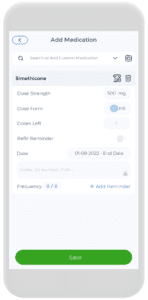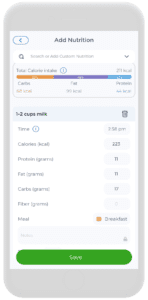
After a heavy meal, many of us complain of feeling too full, like our stomach is tight and protruding. After certain meals (I’m looking at you Mexican food), we may also feel like we have a bubbly stomach and, well, gassy. Bloating and feeling gassy are sensations many of us have felt at one point or another in our lives and are quite natural. While both resolve themselves most of the time, some occurrences may leave you struggling with gas and bloating for days/weeks. Often, these sensations become symptoms of another bigger cause, such as some digestive issue or underlying medical cause. Thus, it is important to track these symptoms, your nutrition, fluid intake, stool and more with trackers such as CareClinic. In turn, this makes it easier to identify suggestive patterns. So, what causes a bloated and gassy stomach, and how do you treat it?
What does it mean to feel bloated?
Much like any other symptom, every person experiences it slightly differently. Painful bloating for one may simply feel unsettling to another1. In fact, the ambiguity of the term is not just confined to the English language but across many other dialects as well2. While someone may claim they feel bloated in reference to the subjective feeling, others may only classify being bloated in terms of the objective and physical. Furthermore, bloating means something different to everyone who uses the term2. Bloating is not one size fits all; it can vary from person to person across a scale. However, one unanimous feature defines bloating: how it feels.
What does bloating feel like?
To put it simply, a bloated stomach feels like a full belly1. Tightness, pressure, and pain, occasionally accompanied by a visibly distended abdomen, are all signs of bloating. It is commonly described as feeling like there is a balloon inflated in your belly. Others describe it as feeling like your belly is stretching1. Moreover, at least in my experience, bloating causes its own bout of uncomfortableness. Moving suddenly seems like a much harder task than before.
Though this is the general consensus and accepted definition of bloating, many use it for other unrelated sensations2. These include the urge to burp, nausea, cramping, gurgling or a rumbling stomach. In fact, it’s also used to convey the urge to go to the bathroom! Overall, almost 24% of patients with bloating report actual abdominal swelling, while the remaining only report the feeling of being bloated2.
How common is bloating?

The short answer: pretty common. I’m sure you’ve heard your friend complain of feeling bloated after a day out eating around town on more than one occasion. Statistically, up to a quarter – that’s 25% – of healthy individuals complain of occasional stomach bloating1. Of that 25%, 75% rate their symptoms as moderate to severe and 10% experience bloating regularly. Only 50% of people report abdominal distention and bloating, and 75% are women before and during their period1.
Now I don’t mean to confuse you with numbers; the takeaway is this: many people experience bloating at some in their lives. How you manage and track your bloating to stay a step ahead of any underlying issues that may be present can set you apart from the bunch. Causes for bloating are various and may be difficult to recognize using only your recollection. The diary function in the CareClinic app helps you keep accurate and easy records of when you experience bloating to help you discover the why. In this way, CareClinic can help you feel secure and in control of your health!
Possible causes of gassiness
Recall how we noted that gas is a natural by-product of digestion. So, what does it mean if you have too much gas? Something isn’t right with your digestion.
The bacteria in your gut digesting carbohydrates use a process called fermentation1. Accordingly, an increased level of fermentation means an excess of undigested carbohydrates1. This could be for a number of reasons, such as:
- Carbohydrate malabsorption – difficulty digesting particular carbohydrates due to an intolerance of other general difficulties1
- Small intestinal bacterial overgrowth (SIBO) – an overflow of colon bacteria into the small intestine. This can overwhelm the other bacteria native to the small intestine, disrupting the delicate balance1
- Functional digestive disorders – IBS and functional dyspepsia are 2 digestive disorders commonly diagnosed when your body struggles with digestion for no apparent reason. Gas build-up, constipation with gas, bloating after eating, nausea, fever, anemia and weight loss are all symptoms of this disorders1
- Visceral hypersensitivity – Imagine you feel like you have gas in the morning, gas when lying down, a gas that won’t come out. Imagine you’re waking up bloated every day, but the volume of intestinal gas you have is normal. Correlated with IBS and other disorders involved in the gut-to-brain neural pathways, visceral hypersensitivity refers to feeling as though you’re gassy and bloated, even when you’re not1
Gas is the biggest and number 1 cause of bloating, and bloating, more often than not, predicts gas1. The two arguably make the perfect partners in crime for a very uncomfortable night.
There are many different possible causes for bloating, each with its own pathophysiology and side effects.
Digestive contents and gassiness
Including solids, liquids and gas, contents can build up in your digestive system due to obstacles or restrictions in the tract itself. This build-up may also occur when the muscles that move your food through your system are impaired themselves. This type of buildup leaves a suffocating environment for normal amounts of gas, fluids, and fats to travel through. Safe to say, everything feels a lot tighter. Constipation, bowel obstruction, motility disorders and weight gain are all possible starting points for a digestive build-up1.
Hormones impact on gassiness
Have you noticed a repeating pattern when it comes to your bloating? This is because bloating can follow cycles other than that of your digestive, any guesses as to which cycle I’m referring to? If you guessed the menstrual cycle, you would have guessed correctly! Approximately 3 in 4 women experience bloating before and during their menstruation. Specifically, female hormones put women at a real disadvantage when it comes to all aspects of bloating. Estrogen causes water retention, estrogen and progesterone both cause intestinal gas by tampering with your motility and to top it all off, estrogen receptors in your gastrointestinal tract also impact your visceral sensitivity. They make you feel bloated. All of this, combined with a full uterus before your period, makes for an uncomfortable bloat1.
Digestive and hormonal bloating have one common factor: they go away. But what if they don’t? What if you remain bloating for days/weeks? Persistent bloating can be a sign of a much more serious issue, including:
- Ascites – the accumulation of fluid in the abdomen, signalling liver disease or heart/kidney failure1
- Pancreatic insufficiency – the decreased production of digestive proteins in the pancreas1
- Gastritis or enteritis – stomach or intestinal inflammation usually caused by bacterial infection of alcohol consumption1
- Cancer – including ovarian, uterine, colon, pancreatic, stomach or mesenteric1
To relieve the bloating means determining why the bloating is occurring in the first place1. For example, gas bloating constipation will only be relieved by spending enough time on the toilet. Bloating due to hormones, however, will likely only be resolved through passing through the motions and hormone balancing. All things considered, digestive and hormonal bloating will likely calm itself down anywhere from a few hours to a few days1.
What is it meant by being ‘Gassy’?
In our discussion of bloating, you may have heard the word ‘gas’ pop up a lot. While the two are commonly found hand in hand, feeling gassy is slightly different from feeling bloated. Everyone has had gas. While it can be… embarrassing, to say the least, gas is completely natural. But how do we define it?
Its core, intestinal gas, comprises many substances, including nitrogen, oxygen, hydrogen and carbon dioxide3. While these gasses are all odourless, that pungent and lingering gas smell is primarily due to trace gases containing sulfur, like hydrogen sulphide, methanethiol and dimethyl sulphide. These sulfuric gasses are actually produced by bacteria present in the large intestine3.
Overall, gas comes from 2 major sources: swallowing air and bacterial interactions3,4. The former is pretty self-explanatory. Sometimes, as we eat or drink, even talk, we accidentally swallow small amounts of air. This air is usually released through burps, and any remaining air is released through, well the rectum4. On an unrelated note, this is how most people burp on command – by subtly swallowing quantities of air. Belching is a manifestation of swallowing air3,4.
In regards to the latter, our large intestine naturally contains harmless and essential bacteria that break down certain undigested foods4. These foods generally remain due to a lack of appropriate enzymes in our small intestine, so the bacteria do the work for us. Moreover, this creates a gas that then goes on to be passed4. Most people produce up to 4 pints of gas a day and pass this gas approximately 14 times a day4.
What does being gassy feel like?
Many people might describe feeling gassy as a large number of trapped bubbles in their lower abdomen, making for a bubbly stomach and gas. Another may describe it as gurgling in their stomach. Some may say it feels like a burp is trapped in their belly. However you describe it, feeling gassy isn’t the most pleasant, especially in important situations. It can be quite the distraction on, for example, a date, in the middle of a presentation to your team, or simply a nuisance when you wake up with gas in the morning. At its core, excessive gas is simply the feeling that your gas won’t come out, either through burping or through the rectum.
While chronic illness or serious disease is quite rare, there are notable symptoms that can indicate a bigger problem. These include:
- Belching too frequently – indicates upper GI disorder4
- Excessive flatulence – passing gas through the rectum more than 23 times a day4
- Abdominal bloating – indicative of a motility disorder such as irritable bowel syndrome4
- Abdominal pain and discomfort – may be confused for heart disease or appendicitis as examples4.
This isn’t all. While feeling gassy may be completely normal and a result of environmental factors, there are cases of a certain disease that causes excessive gas in the stomach and intestine that are important to be aware of. The first of these is splenic-flexure syndrome, a chronic disorder caused by trapped gas at the bends in colon4. Additionally, Crohn’s disease, colon cancer, internal obstructions, internal hernias, or scar tissue may cause gas build-up, bloating and pain4.
Diagnosing excessive gas
Objectively, it’s incredibly difficult for a physician to diagnose a patient with excessive gas3. Over the years, we have developed some useful tools to help narrow down the cause and assist with an appropriate diagnosis. In addition to a medical history and physical examination, the following tests may be required by your doctor:
- Abdominal x-ray4

- Colonoscopy – this procedure allows the physician to view the length of the colon. Resultantly, abnormal growths, inflamed tissue, ulcer, and bleeding become more apparent and can be diagnosed. Tissue can also be removed for further examination if necessary4.
- Sigmoidoscopy – using a sigmoidoscope, the internal part of the colon is visible for analysis.
- Upper GI (gastrointestinal) series – this diagnostic test examines the upper organs in the digestive system, including the esophagus, stomach, and beginning of the small intestine. After swallowing barium, these organs become visible on the subsequent series of x-rays4.
You may have noticed by now that everything discussed so far goes hand in hand. Gas is often accompanied by bloating and vice versa. Each symptom on its own generally is a predictor of the other. Experiencing gas in the morning likely means you are waking up bloated as well, and similarly, gas when lying down may suggest bloating at night. While this is just one pairing that has proven its strength time and time again, there is another factor that appears to pop up as well: constipation. Together, gas bloating constipation is quite the combo and one that many have experienced in their lives.
Constipation with gas
The 3rd unforgettable member of this trio is constipation. By definition, chronic constipation is “infrequent bowel movements or difficult passage of stools that persist for several weeks or longer” 5. The term is used to cover a range of features, including hard stools, straining, bloating and abdominal pain6. Although occasional constipation – lasting less than one week in duration – is quite common, chronic constipation can have a serious impact on the quality of one’s life5,6. Therefore, gas becomes trapped and bloating occurs, completing the trio of gas bloating constipation. Moreover, constipation with gas and with bloating is only the tip of the iceberg when discussing the other symptoms involved. These include:
- Feeling as though there’s a blockage in your rectum5
- Feeling as though you can’t completely empty your stool5
- Needing help to empty your rectum, for example, pressing on your abdomen5
The most common cause of constipation is the slow movement of stool through the digestive tract5. By the time it reaches the rectum, the stool is hard and dry, making it much harder to pass. Other causes include blockages in the colon or rectum that cause constipation with gas, problems with the nerves around the colon and rectum, difficulty with the muscles involved, and hormonal imbalances5.
Natural remedies for being bloated and gassy
Despite this power team of symptoms, all three are manageable through a variety of both natural and man-made medicinal strategies.
Get enough fiber
Fiber acts as a natural cleaner, eliminating fermenting fecal matter stuck within your digestive tract. Although it may initially cause more gas, fiber also helps feed and maintain healthy gut bacteria, making it an amazing probiotic. Moreover, fiber tells your body to drink more water, increasing motility and helping you feel fuller. This will help to control overeating and, as a result, bloating, gas and constipation1!
Stay active
Exercise keeps your bowels moving. Getting up to go for a walk every now and then can prevent water retention that may cause bloating while eliminating constipation as well1.
Diet for bloated and gassiness
It’s also important to watch your diet when it comes to gas, bloating and constipation. Processed foods can cause water retention and slow your digestion, leading to constipation and bloating. Low nutritional foods can also leave you feeling a lot hungrier than their healthier counterpart. Eating healthier foods, practicing mindful eating, eliminating food sensitivities you may have noticed and eating probiotics all can help your diet shape into what works best for you1.
Gas-X
The #1 doctor-recommended and most well-known oral medication used for gas and bloating is simethicone – more commonly known as Gas-X7. As an active agent, simethicone breaks up the gas bubbles in your digestive tract7. Resultantly, Gas-X also relieves excessive burping and discomfort in your gut8. One of the benefits of using Gas-X is its lack of side effects; however, like most other drugs, consulting with your doctor is best to determine if you are allergic or unable to use it due to situational circumstance8.

A common theme you may have noticed is that your diet plays a huge role in maintaining and preventing gas and bloating. Most of the time, eliminating foods through trial and error or picking up on patterns in your eating and symptoms can help you draw correlations between the two factors. The CareClinic platform makes this possible through its symptom and nutrition trackers.
Drawing correlations has also never been easier with the correlations feature in the platform, making CareClinic an essential tool in managing your gut health. Moreover, CareClinic’s medication feature will help you to record how often and when you take gas medications such as Gas-X. This can help to quickly identify allergies or adverse effects you may be having on the medication.
Take control of your health all in one place and feel secure knowing you’re doing all you can to prevent feeling bloated and gassy.
References
- Cleveland Clinic. (2021, September 10). Bloated Stomach. Retrieved from: https://my.clevelandclinic.org/health/symptoms/21740-bloated-stomach
- Azpiroz, F., & Malagelada, J-R. (2005). Abdominal Bloating. Gastroenterology, 129(3), 1060-1078. https://doi.org/10.1053/j.gastro.2005.06.062
- Suarez, F. L., & Levitt, M. D. (2000). An Understanding of Excessive Intestinal Gas. Current Gastroenterology Reports, 2, 413-419. https://doi.org/10.1007/s11894-000-0042-8
- John Hopkins Medicine. (n.d.). Gas in the Digestive Tract. Conditions and Diseases. Retrieved from: https://www.hopkinsmedicine.org/health/conditions-and-diseases/gas-in-the-digestive-tract
- Mayo Clinic. (2021, August 31). Constipation. Diseases & Conditions. Retrieved from: https://www.mayoclinic.org/diseases-conditions/constipation/symptoms-causes/syc-20354253
- Camilleri, M., Ford, A. C., Mawe, G. M., Dinning, P. G., Rao, S. S., Chey, W. D., Simrén, M., Lembo, A., Young-Fadok, T. M., & Chang, L. (2017). Chronic constipation. Nature Reviews Disease Primers, 3(17095). https://doi.org/10.1038/nrdp.2017.95
- Gas-X. (n.d.). How Does Gas-X Work?. How it Works. Retrieved from: https://www.gas-x.com/how-gas-x-works/
- WebMD. (n.d.). Gas-X 80 Mg Chewable Tablet – Uses, Side Effects, and More. Drugs & Medications A-Z. Retrieved from: https://www.webmd.com/drugs/2/drug-9208/gas-x-oral/details



